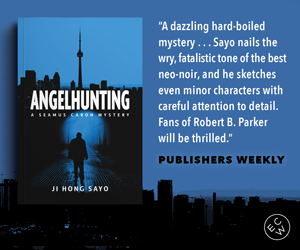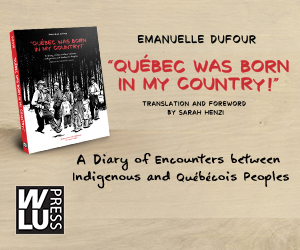An Interview with Justin Million, host/star of KEYBOARDS!
By Ben Ladouceur
For the last few years, Peterborough poet Justin Million has been hosting (starring in? living? breathing?) a weird interpretation of the poetry reading called KEYBOARDS! As with any reading, poems are read to an audience. Less typically, however, the poems are also written on the spot, on a little typewriter situated in the corner. Justin stands and recites his works as he writes them, and leaves the typed poems on his table for anyone to take home. He works into the wee hours, as attendees drink and converse amongst themselves, as they would whether there was a live performance taking place or not. Sometimes there’s a second poet, paired with a second typewriter, in a duel. Here, Million, also the co-editor of bird, buried press and the author of a few chapbooks, speaks about the hopeful appeal of KEYBOARDS!, the trick to getting people to leave their house, and the meaning of community.
Ben Ladouceur:
To begin, could you provide us with a brief outline of KEYBOARDS! – how it works, what’s involved, who’s involved, and maybe some of the reasons behind its unusual form?
Justin Million:
At KEYBOARDS!, I encourage attendees to talk amongst themselves so that I might mine their conversations for material for my improvisational typewritten poems, so folks aren’t forced to sit and pretend to pay rapt attention for 45 minutes to an hour of straight poems as they would at a traditional reading. Not that there’s anything wrong with the traditional reading model – I also host those kinds of readings in Peterborough as part of my Show and Tell Poetry Series – but I wanted to do something different, as I feel there are enough traditional poetry reading series’ out there. I will also pull inspiration or words from the music playing in the bar, from the folks passing by the window or the door, from the weather, or from the local news or goss of the day in order to curate a uniquely local poetic experience. Audience members, or familiar local lore or landmarks, will become the stuff of poetry. Folks are routinely shocked to be included in art, especially the regulars. I bring no notes, and there is no prep. The Garnet outfits me with a bell, which I *DING* when I have completed a poem, and then I recite that poem immediately, without editing, and place that poem on a stool in front of me for a willing audience member to take home, or give to a friend, or rip up and stomp out… all for a small donation to the “Art Jar”. I keep no copies of these poems, so the one you pick up off the stool is the only copy of that poem.
After moving back to Peterborough from Ottawa, I wanted to start a reading series, or monthly event of some kind that was different than more traditional readings. I want to thank Melinda Richter and Sean Conway for inviting me to establish weird poetic happenings in their respective venues. I think, given that a KEYBOARDS! audience only has to pay attention to me for about 10-15 minutes per night total, or however long it takes to read the poems aloud, this has to be one of the easiest readings or poetry events to attend: show up with friends, drink, and hear a poem (that might include you) every 10-20 minutes. And between poems you get to be serenaded by the sound of a typewriter.
BL:
The only iteration of KEYBOARDS I have seen so far was a “duel” between you and jesslyn delia smith. I could not tell who won. Who won? What’s the difference in feeling and spirit between KEYBOARDS on your own and as a duel?
JM:
I won, of course. It’s MY event. I mean, it was kind of unfair of me to even invite her, given that she had no chance of defeating me. Right, jesslyn?
The most discernable difference between DUELING KEYBOARDS! and the more traditional KEYBOARDS! nights is that you feel the push to create a more ‘successful’ poem when your work is forced to stand directly beside another poet’s work. People are going to compare the work, whether that comparison is deserved or not, so you want to give your all. jesslyn is a good friend of mine, and an accomplished poet, so I was pushing myself to keep up with the quality of her work, and I hope she was trying to do the same with me. The dueling aspect is a microcosm of my university experience, where I was coming up with a really amazing young group of poets at Carleton, I think we were all infinitely better by the time we left school than when we started due to how much we pushed each other. However, because these events tend to take place at bars where the audience is not always there to hear poetry, to include them or even win them over there has to involve striking a balance between crafting funnier or more blatantly entertaining poems, and more abstract or elusive work. My audiences are not your average poetry crowd, as the bar is open to anyone who might be persuaded to walk in. If I were to write the same type of poems at KEYBOARDS! as I do at home (poems about the Large Hadron Collider, poems about The Solway Firth Spaceman) people might tune out. There is a lesson in that dynamic about how audiences relate to poets in general.
I also defeated Jeff Blackman. For the record.
Your CanLit News
Subscribe to Open Book’s newsletter to get local book events, literary content, writing tips, and more in your inbox
BL:
You once told me that your very best poems these days are products of the KEYBOARDS experience. This was heartbreaking to you, since those poems are given away, and you never get to see them. What does the KEYBOARDS process contribute to your muses to make these poems so much better?
JM:
Maybe I was a little down on my output when I told you that, Ben, because I don’t feel that way anymore, and maybe that’s because I’ve started really thinking about (and putting down on paper) what my KEYBOARDS! experiences, and working on a typewriter, have done to my writing. I won’t relate all of this thinking to you now, but, in essence, the live typewritten poetry allows me to forgive my darlings, as I don’t edit, or start poems over again when I haven’t started a poem in the strongest way: it forces me to fight a little harder to articulate the meaning in the work. There are, of course, time constraints involved in writing in front of a live audience, so the pressure is on, but I think any poet worth their salt can write a decent poem on the spot if they were forced, I just find that most poets want to retain their ‘best stuff’ to procure writing credits from journals, or to save for the trade book they’re working on. Many ‘established’ poets (whatever that terrible industry word means) would likely see my raw KEYBOARDS! work as being inferior poetry. I mean, I get it: I want a trade book too, but, I once got a text from a friend who was visiting Ottawa that included pictures showing two of my earlier KEYBOARDS! poems framed in a stranger’s living room. That’s why I do it. It is difficult to frame a trade book.
BL:
I’m going to talk about television for a second but I promise I have a point. So, because the key demographic now downloads their favourite shows to watch on their own schedule, television has found new ways to appeal to advertisers, by forcing people to watch at a certain time. We end up with live musicals, countdown clocks to certain programming, and plots so twisty that social media becomes an instant minefield of spoilers to slowpokes. There is a “you had to be there” quality to KEYBOARDS that reminds me of event-based television, since part of the fun is watching it happen live. Do the poems produced in KEYBOARDS hold up on their own, or does their genesis contribute substantially to their value? What is your ideal consumer’s relationship to the work produced during KEYBOARDS?
JM:
All of the KEYBOARDS! poems are not winners, of course (I just reached KEYBOARDS! poem #400 at the last event, and no poet has ever written 400 solid poems). However, as I touched on earlier, there is a unique dynamic inherent in mining a live audience for poetic material, and then including that audience’s voice directly in the work. Folks are chuffed to be included in a poem, as most audience members have little to no experience with poetry. Some folks who attend are downright against poetry, so it’s a challenge to enter their space and do your own thing. In this sense, sometimes you might feel more compelled to write something about the Leafs, or Peterborough’s terrible current mayor, just to create inroads into the audience’s trust. When that’s the case, the poem barely holds meaning outside of the venue, so, what is the value, then, of that poem? For the recipient, it might mean something so personal that it’s worth framing, or it might amount to no more than a peace offering between me and the audience to show them that I am here for them, not to pontificate or elevate my own ideas above theirs... though if you know me at all, there’s quite a bit of pontificating at these things, too. My lovely partner Elisha is always there to keep me polite.
I think of the 400 poems I’ve written in the series so far, maybe 25 or less “hold up” in terms of being of publishable quality, ie: journal-worthy… but who can say? Most KEYBOARDS! poems are difficult to attribute any importance to outside of the room that night, but those poems sometimes hold more communal or local value. For instance, there was a mild scandal here in Peterborough involving a botched scheme by The City to create a new city slogan, which they paid a local ad firm $77,000 to do, which was then promptly shot down by the people. So, they made a second slogan, which was just as Hallmark-awful. So, at KEYBOARDS! that month I did a series of lists of possible Peterborough slogans that are, shall we say, a little less for the city than against (which I can say because I was born here, right?), which the attendees that night really responded to. To this day, some people know KEYBOARDS! more for those Peterborough slogan poems than for anything else I’ve written at my events, because those poems struck a chord: an attendee actually commissioned a similar list poem for himself because he loved the concept so much. These kinds of poems would have no context or effect outside the city, and would also have a lesser effect outside that particular room and those particular people, but they’re ‘important’ poems in the sense that we (the artist AND the audience) were all included in the work, together. Therefore, the poet and the audience are locked in a symbiotic experience: if it wasn’t for Them pushing Me, I would write mostly confessional poems that would succeed only in alienating my crowd.
My ideal consumer’s relationship to the work being done at KEYBOARDS! is the consumer leaving the event knowing that they were just as integral to the work being done that night as I was typing it out. They also never hold me accountable for my lackluster grammar and vocabulary, which is nice, and is at best, as you can tell, a laymen’s… which might be one of my best qualities as a poet.
BL:
What does your community mean to you as an artist?
JM:
Aside from how I’ve briefly touched on this already, I’m still not really sure how the community is affecting my work, to be honest. I think in order to assess that question properly you also have to have some kind of sense of how your art is affecting the community, and I haven’t been back here long enough to really know what they’re thinking. The events are growing in attendance, so that’s something. And some folks are really into it, which is obviously humbling, but I’m really just trying to fit in here, and expose as many folks in town to poetry as possible. I was also born and raised here, as I said, and came back, which lends me a unique perspective on how the city has changed over time. But, as much as I would like to assert my opinions and perspectives over my audience sometimes, to assert myself on stage, the best way to engage your community through art, I think, is to listen, to attempt to give your community something that is not already readily available. I would challenge anyone in Peterborough to tell me that KEYBOARDS! is not a novel poetic event. If it were ever to become tiresome, entirely too high-minded, or all about me, then I would stop. I will likely hit KEYBOARDS! poem 500 before the summer… maybe I’ll reassess then, and do something else.
What does my community need? I think KEYBOARDS! fulfills a need for a more accessible poetry experience in the city, where the folks who are more comfortable in their basements or dark corners might feel more welcome at my events by not having to adhere to the same unspoken rules of more traditional poetry readings or events. There is no participation required beyond filling a chair, and ideally ordering a beer to keep the House happy. However, we have a very rich and varied spoken-word community here also, so there is definitely a welcome place for every kind of poet here, and I’m very happy to be able to add my voice to the pre-existing poetry community here. If I can make the last Sunday of the month better for anybody who walks in to The Garnet on Hunter St. at 8PM, then I have done my job. It IS, or can be, a job. Poets are frustratingly humble: we refuse to think of ourselves as being able to provide a service to people. We can. We see the world, and the city, and their dynamics, differently than most. Why not celebrate that difference? Why write otherwise, if we’re just elucidating issues or moments that anyone could expound upon in a meaningful way? Why not just fill our diaries?
There are entire worlds waiting to be explored in my city; about 85,000 of them.
BL:
Read any good books lately?
JM:
I am currently making my way through Matthew Zapruder’s “Why Poetry”, which is required reading for the planet Earth. I have never approached such an elegant case for the accessibility of poetry. Poetry has an inaccessible rep, which is unfortunate, and more a product of how it is taught than practiced. If you haven’t read it, as a poet or as a poetry enthusiast, you are currently losing.
KEYBOARDS! performances typically take place on the last Sunday of the month at 8PM at The Garnet in Peterborough, Ontario. But the next iteration takes place on a Monday – March 26 at 8PM. The Garnet is a street-level venue with no steps and an accessible washroom. All are welcome.
The views expressed by Open Book columnists are those held by the authors and do not necessarily reflect the views of Open Book.
Ben Ladouceur is a writer living in Ottawa. His first collection of poems, Otter (Coach House Books), was selected as a best book of 2015 by the National Post, nominated for a 2016 Lambda Literary Award, and awarded the 2016 Gerald Lampert Memorial Award for best debut poetry collection in Canada. Ben is the prose editor for Arc Poetry Magazine.



